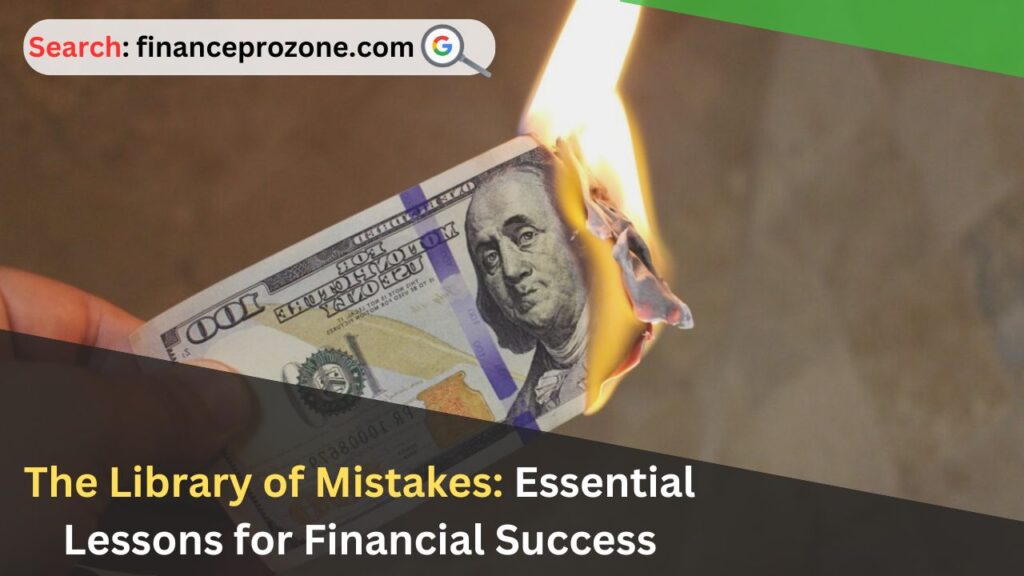The Library of Mistakes: Essential Lessons for Financial Success
Introduction
Financial success doesn’t require perfection—it requires learning from past mistakes and avoiding common pitfalls. Think of life as a vast library where every financial error is a lesson. By understanding and steering clear of these errors, you can build a strong foundation for wealth and stability.
Let’s delve into the essential lessons from the “library of mistakes” and discover how to secure your financial future.

1. Neglecting to Create a Financial Plan
A financial plan is your roadmap to success. Without one, you’re likely to wander aimlessly, spending without purpose and saving inconsistently.
“Failing to plan is planning to fail.” – Benjamin Franklin
Key Components of a Financial Plan:
- Clear goals (short-term and long-term).
- A budget that aligns with your priorities.
- Emergency fund and investment strategies.
2. Living Paycheck to Paycheck
Many individuals struggle to break free from the cycle of living paycheck to paycheck. The problem often lies in not differentiating between needs and wants.
Solution: Start by tracking expenses, cutting unnecessary costs, and building an emergency fund. Even saving a small percentage of your income can help break this cycle over time.
3. Over-Reliance on Credit
Credit cards can be a useful tool, but over-reliance can lead to debt spiraling out of control. High-interest rates on unpaid balances make this a costly mistake.
“Debt is like any other trap, easy enough to get into, but hard enough to get out of.” – Josh Billings
4. Ignoring the Power of Compound Interest
Compound interest is often called the “eighth wonder of the world.” The earlier you start saving and investing, the more you benefit from its exponential growth.

Comparison Table: Starting Early vs. Late
| Age Started | Monthly Contribution | Savings at 65 (7% ROI) |
|---|---|---|
| 25 | $200 | $480,000 |
| 35 | $200 | $240,000 |
| 45 | $200 | $110,000 |
5. Skipping Emergency Funds
An emergency fund acts as a financial cushion during unexpected situations like medical expenses, car repairs, or job loss. Not having one can lead to high-interest debt or financial stress.
Goal: Save three to six months of essential living expenses.
6. Underestimating the Importance of Insurance
Insurance protects you from catastrophic financial losses. Without adequate coverage, an unforeseen event can wipe out years of savings.
Essential Types of Insurance:
- Health insurance
- Life insurance
- Property insurance
“Prepare for the worst, but hope for the best.” – Anonymous
7. Delaying Retirement Savings
Retirement might feel far away, but time is the most valuable asset in saving for your golden years. The longer you wait, the harder it becomes to catch up.
8. Failing to Diversify Investments
Investing all your money in a single stock or industry is risky. Diversification minimizes risk and ensures you don’t lose everything if one investment fails.
“Don’t put all your eggs in one basket.” – Warren Buffett
9. Emotional Spending
Shopping to cope with stress or boredom often leads to regret. Emotional spending can derail your financial goals. To avoid this, follow the 24-hour rule: wait a day before making any non-essential purchase.
10. Lack of Financial Education
Financial literacy is the foundation of making informed money decisions. Without it, you’re likely to fall victim to bad advice or predatory financial products.
Resources for Learning:
- Books: The Intelligent Investor by Benjamin Graham.
- Online courses: Coursera and Khan Academy offer free finance courses.
- Podcasts: Listen to financial experts like Dave Ramsey or Suze Orman.
Conclusion
The library of financial mistakes holds valuable lessons for anyone willing to learn. By avoiding these common errors, you can create a secure financial future for yourself and your family. Remember, financial success is less about how much you earn and more about how wisely you manage it.
👉Work From Home – Flexible Online Jobs Waiting for You>>>
FAQs
- What is the best way to start saving?
Start small, automate savings, and gradually increase contributions as your income grows. - How can I stop living paycheck to paycheck?
Create a budget, reduce unnecessary expenses, and focus on building an emergency fund. - Why is financial literacy important?
It helps you make informed decisions, avoid scams, and achieve your financial goals. - How can I manage emotional spending?
Use the 24-hour rule and set clear financial goals to keep impulsive purchases in check. - What’s the biggest financial mistake people make?
Living without a financial plan is one of the most common and impactful mistakes.
